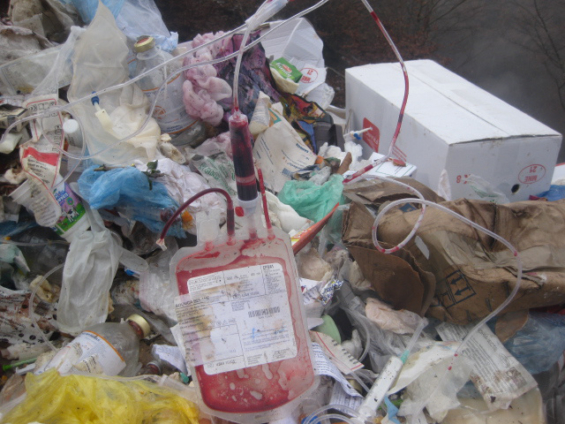It is widely understood that municipal solid waste, if not managed correctly, can be an environmental and health hazard. However, medical waste, by its very nature poses a significantly higher risk to both the environment and especially to the community. In addition, it is estimated that 15% of waste created by health-care activities are classified as hazardous waste, which includes biomedical waste.[1]
Biomedical waste is waste generated from biological and medical sources including medical laboratories, hospitals and clinics. This classification of waste includes discarded blood, tissue from surgery or birth, gloves, used bandages, and sharps such as syringes, needles, and blades. An estimated 16 billion injections are administered worldwide annually. In Africa, and specifically Ghana, a large proportion of the needles and syringes are discarded as general solid waste and not treated as medical waste.
Biomedical waste has a higher risk of injury or infection compared to ordinary waste, therefore, safe and reliable methods for its management are crucial. Inadequate and inappropriate handling of biomedical waste is likely to have serious public health ramifications through direct contact or indirectly through the environment. An example of the indirect impact is observed when farmers irrigate their crops with the same source of water from drains that are used to dispose of the biomedical waste. In 2012, this allegedly occurred in Accra, when liquid medical waste from the 37 Military Hospital flowed freely into the main gutters of the capital city for over a year, affecting the health especially of those living close to the hospital.[2]
According to the World Health Organization (WHO), “National legislation is the basis for improving medical waste practices in any country. It establishes legal controls and permits the national agency responsible for the disposal of medical waste, usually the ministry of health, to apply pressure for their implementation. The law should be complemented by a policy document, and by technical guidelines developed for implementation of the law.”[3] National legislation combined with rigorous enforcement, is thus one of the major prerequisites for effective management of biomedical waste in Ghana.
Despite a detailed Ministry of Health Policy guideline on medical waste handling published in March 2006, the purported need for complementarity between the law and the policy paper does not exist in Ghana because national legislation on handling biomedical waste does not exist. It is against this backdrop that this report aims to expatiate on the advantages of such legislation and the potential health risks of not having it.
Read the full report below:
Latest Stories
-
Education Minister opens CIHRM 2025 conference
13 minutes -
The Pulse & Vbyz Experience: A Galdem DJ Mixtape
38 minutes -
Kennedy Agyapong don’t need much marketing – Kwesi Kwarteng says ahead of NPP’s 2026 primaries
40 minutes -
Maison Yusif shines on global stage at Barcelona Perfume Congress
54 minutes -
Shirley Frimpong Manso is perfectionist and doesn’t compromise on that – Joselyn Dumas
56 minutes -
We don’t celebrate our own enough – Shirley Frimpong-Manso to Ghanaians
1 hour -
Genesis Foundation launches campaign to tackle Teenage Drug Abuse on June 21
2 hours -
GII urges Mahama to match words with action on anti-corruption commitments
2 hours -
“I Needed to Speak”: Funke Akindele gets candid about loss and mental health
2 hours -
JoyPrime’s TroTro Diaries partners with COMAC to champion fuel quality and road safety
2 hours -
Clara Kukua Savage
2 hours -
GAFOSC in commanding form ahead of decisive UG Corporate League clash
3 hours -
99% of NPP Council members backed early presidential primary – Justin Kodua
3 hours -
Ablekuma North collation: Police playing funny games with us – NPP
3 hours -
Education Ministry orders nationwide audit over poor quality of SHS meals
3 hours

